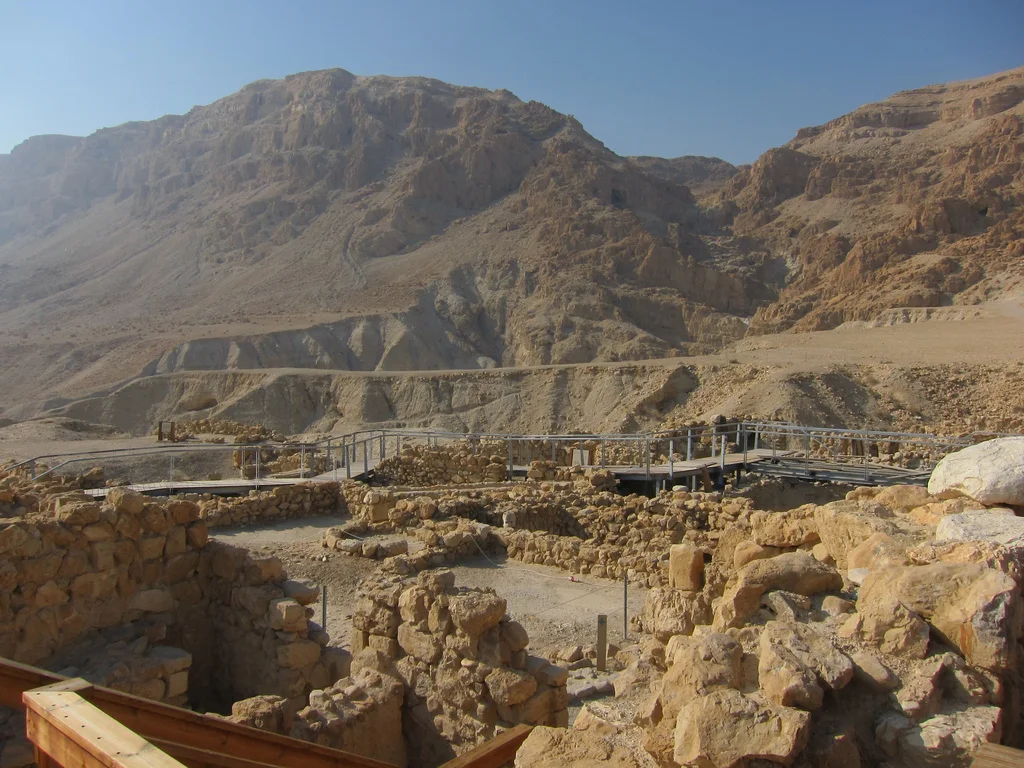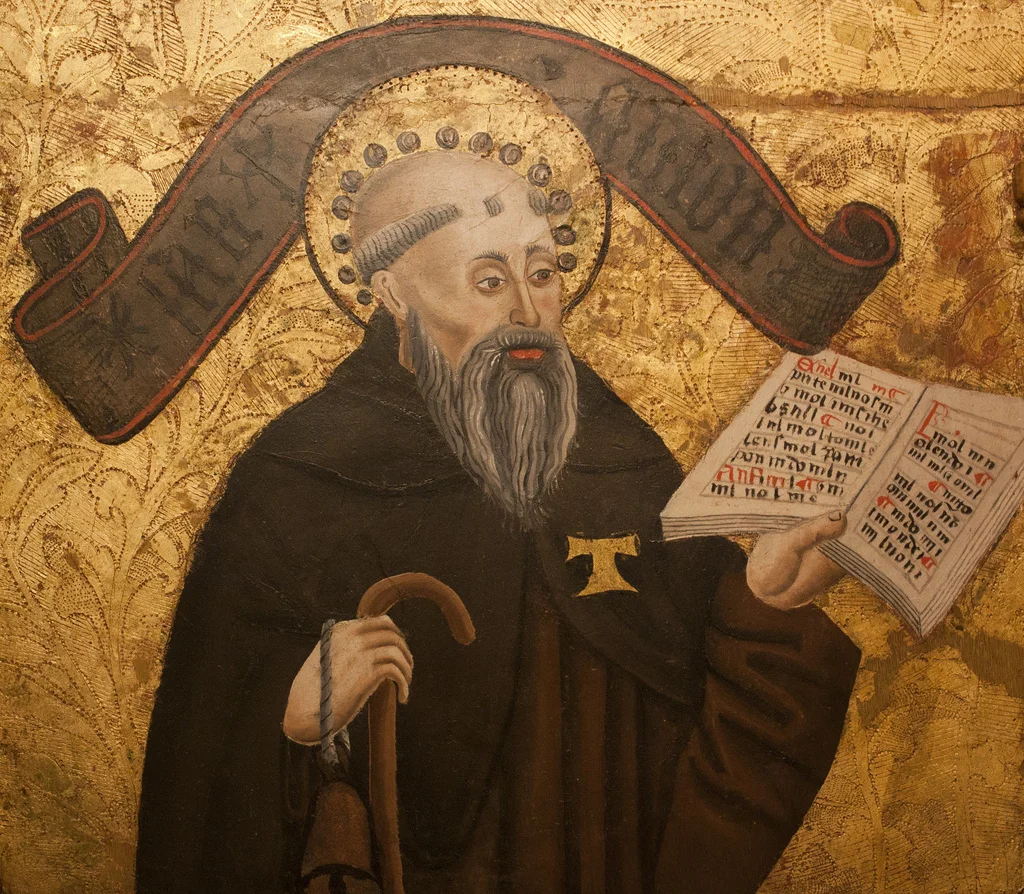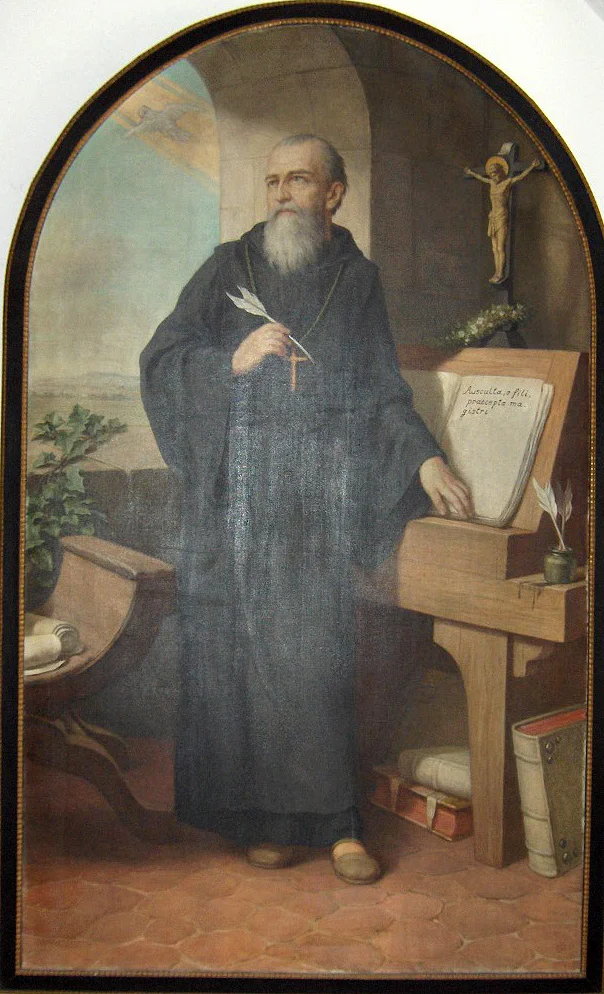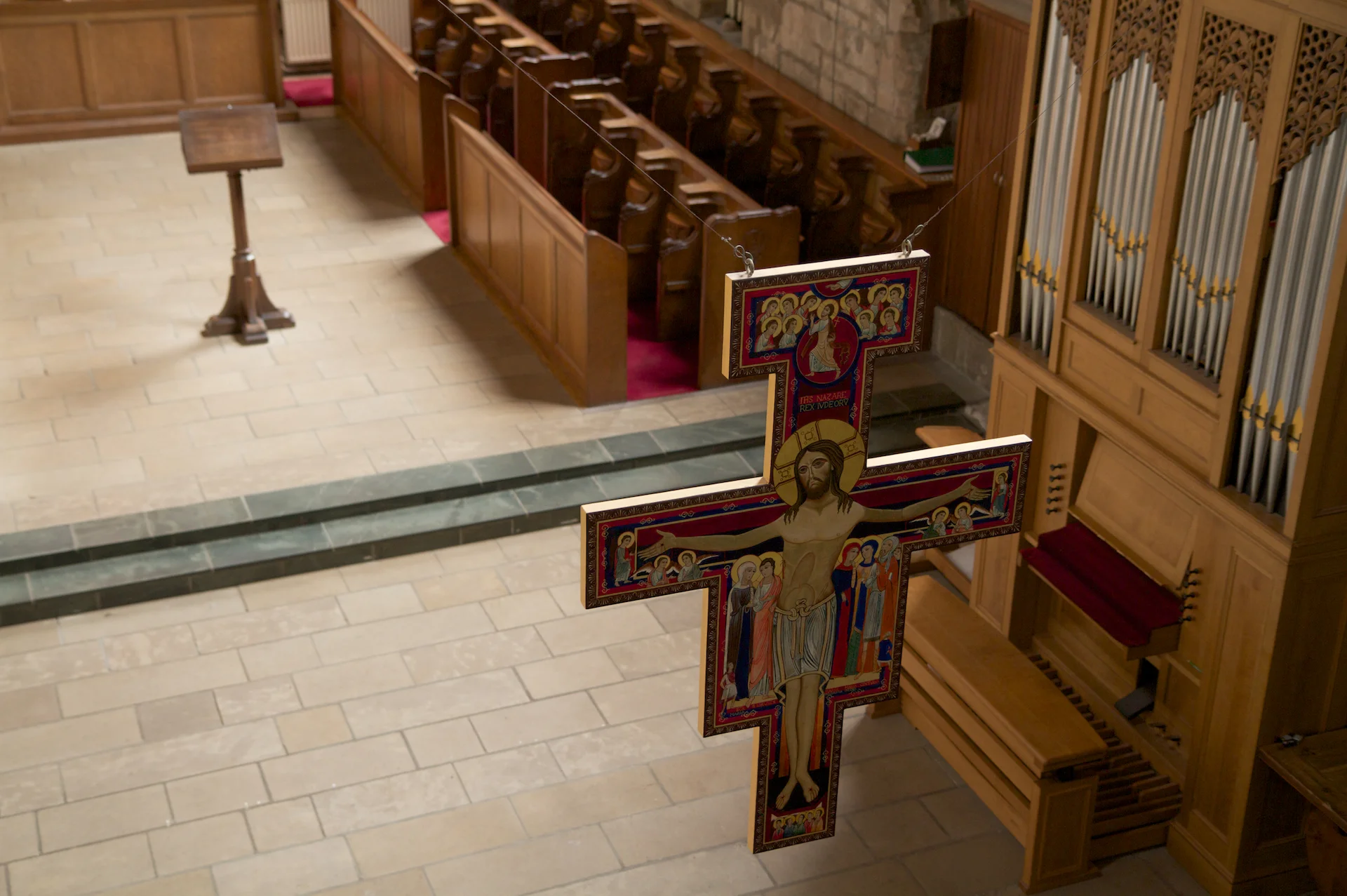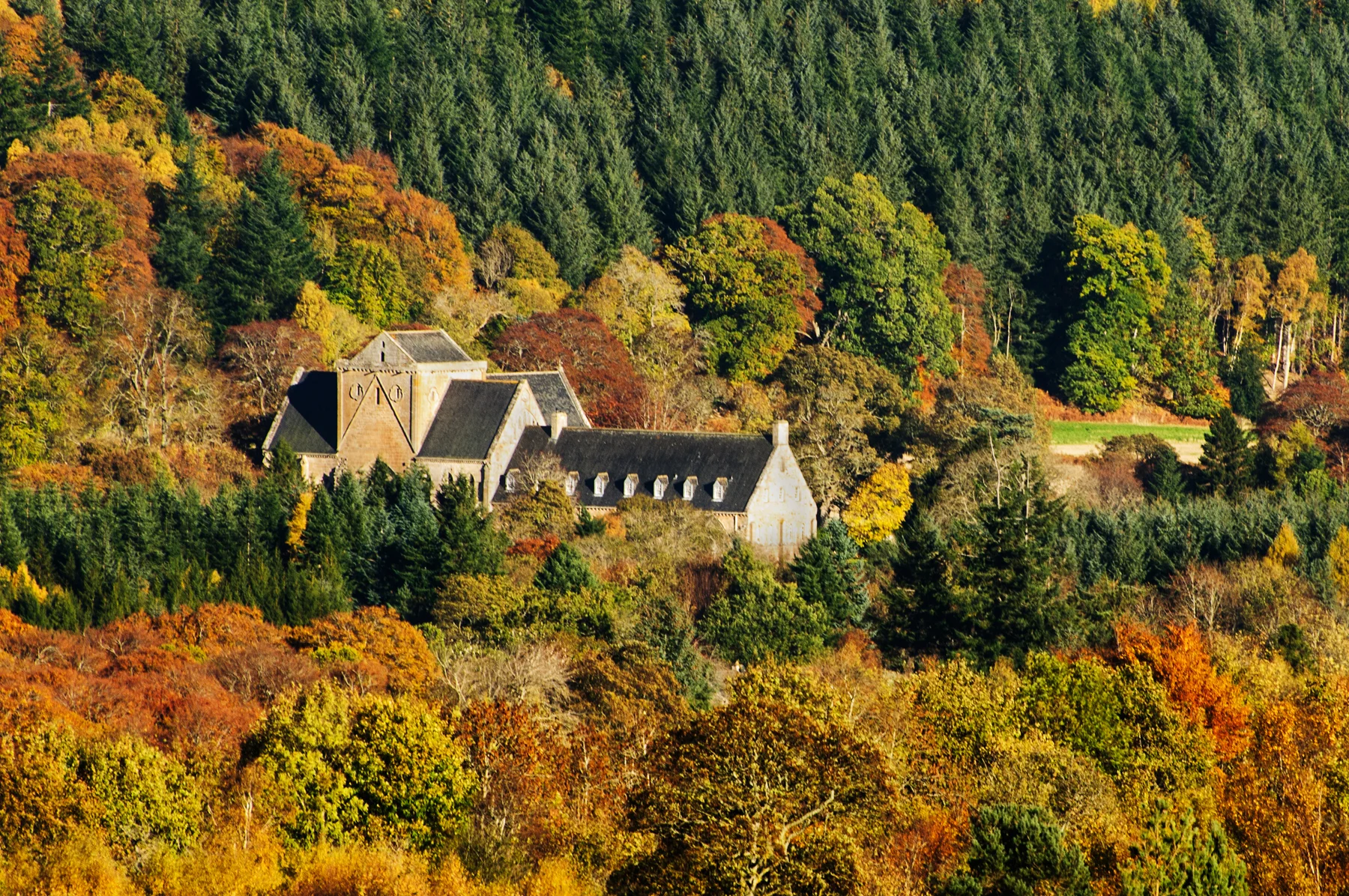On Monastic Life: its Origins and Meaning
Talk originally given to a group of young people in February 2013
By Dom Benedict Hardy OSB, Prior of Pluscarden
Q'mran National Park. Image by Jon Kleinman
Nobody really knows when Christian monasticism started. We know that monasticism in other religions pre-dated Christianity by many centuries. That shows that monasticism as a phenomenon is natural; it corresponds to a basic human need and desire. There were some foreshadowings of Christian monasticism within late Judaism and in the very early Church. We think of the Essene community at Q’mran, and the life of St. John the Baptist. He lived in the desert, in asceticism, maintaining celibacy and regular fasting, in service of his dedication to God and the prophetic mission entrusted to him. The first Christian Community in Jerusalem is also often held up as a model for monasticism, in that the believers lived together in radical community, sharing all their goods in common.
During the centuries of persecution, the idea of separating oneself from society as a whole and living a life of prayer in the desert or remote place seems to have occurred quite spontaneously all over the Roman Empire. But it was the life of St. Antony of Egypt which really brought the idea into the Christian mainstream.
Antony was born c. 252, that is, when the Emperors were still pagan and persecuting Christianity. He died as a very old man c. 356; that is, some decades after Constantine had become Emperor and made Christianity, if not yet the official religion of the Empire, at least respectable. Antony is famous because St. Athanasius wrote an account of his life, and that account became the equivalent of a block-busting best seller. For all the extremes of heroic asceticism recounted there, the story was designed for everyone. Athanasius wanted to hold up Antony as in some way a model for all Christians. St. Augustine tells in his Confessions of the effect it had on him when he read it. He contrasted his own life, so compromised, so self-centred, so entangled in the things of the world and the flesh, with that of Antony, so pure, so radical, so obviously holy, and it made him weep.
St. Antony’s vocation came when as a young man, not yet 20, he went to Church and heard the Gospel of the rich young man. If you would be perfect, said Jesus, go, sell all you possess, and give the money to the poor, then come, follow me. Rather like St. Francis about 1000 years later, Antony heard these words as addressed directly to himself. So he literally fulfilled them, and sold his inherited estates. Actually at first he kept back a little money so as to be able to look after his younger sister; but next time he was in the Church the Gospel was Do not be anxious abut tomorrow. So he entrusted his sister to the care of some nuns, and gave away absolutely everything.
Antony was free now to devote his whole life to the following of Christ. But how do you do that? There are of course many different paths to follow. The one Antony took may well seem disconcerting. He went off to live in the desert in complete solitude. There he lived in fasting, night vigils, and ceaseless prayer. There too, as St. Athanasius vividly describes, he fought in single combat with the devil.
St. Anthony of Egypt. Image by Lawrence OP
Athanasius tells us that Antony went deeper and deeper into the desert, in order to escape the many people who wanted to flock around him. Eventually he found a remote ruined fort, and spent 20 years there alone, speaking not a word in all that time to anyone at all. He survived on dry loaves which were periodically brought to him. But eventually word got out about him, and a crowd came out to find him and drag him out if necessary by force. Everyone assumed he’d be stark staring mad. But he wasn’t. He was completely sane. He was also completely healthy mentally, physically, and spiritually. As Athanasius presents the scene, when Antony saw this crowd, he was neither elated nor dismayed. He gave sound spiritual advice to the people; he healed their sick; he countered heresy. In this way his whole way of life was authenticated. Two things especially were demonstrated: that following Jesus without compromise is not bad for you, but on the contrary; and that Antony really did follow Jesus, and not just his own illusions. After that Antony trained many others to follow his own path to God, and so although he was certainly not the first monk, he is known as the Father of monks. Always though he would withdraw again into holy solitude, in which blessed state he died.
From that day to this, the heart of the monastic vocation has been to do what Antony did: to turn away from society, from the world, from all that most people seek after in life, in order to seek God alone. And from that day to this monks have understood that their vocation does not separate them from the Church, but on the contrary situates them at its heart. A monk, says Evagrius, is separated from all only to be united with all. Far from hating the Church and the world, he loves them in the Heart of Christ, and strives to uphold them by his prayer.
Nowadays perhaps we are pre-programmed to think of a project like this as somehow essentially selfish, or even anti-social. But the Catholic Church has always defended it, treasured it, supported it, legislated to maintain its purity.
I think it’s helpful to consider the example of Jesus himself by way of analogy. For 30 years he lived a relatively normal family life, in a remote provincial village, in humble circumstances. Then for 3 years he preached, taught, healed the sick, fed the hungry, raised the dead, formed his disciples. But then, at the end of his ministry, he gave all that work up, as he turned his face to Jerusalem. When he was hanging on the cross, it was as if all his power for others was taken away from him. But of course we know that there above all he did his true work; there he saved the whole human race; there he brought radical healing - there he most powerfully proclaimed the Gospel of God’s unconditional love - love to the end - for all people whatever - for sinners; there he showed us all how to live, and how to die; there he opened up for us the way to eternal life.
One of the wonderful things about monasticism is the huge body of literature it has produced. We’ve been going for over 17 centuries, and monks have never stopped writing through all that time; but the most fertile and fruitful time for writing was the early period: the first few centuries. Apart from the desert fathers in Egypt, who wrote in both Coptic and in Greek, we have early monastic literature in Syriac, Armenian, and Latin; from Cappadocia, Palestine, Croatia, France and Italy, North Africa and Ireland... Astonishingly, what these monks write is not (by and large) bizarre and eccentric, but sane and wise. What they teach can be applied to pretty well anybody in any situation, because at root it’s simply radical following of Christ; radical living out of baptism. Nowadays a lot of this material is available in English translation, and it’s become quite popular in the spiritual literature market. Lots of ordinary modern people find it refreshing, challenging, full of helpful insight. The monastic fathers also spoke a lot about the mind, and thoughts, and what to do with them, and so they are read nowadays also for their psychological insight. They speak, often with a good deal of humour, of how we easily deceive ourselves; how we easily and often we are led astray, and how we can keep in a healthy way on the path towards true Christ-like holiness.
Attendees at the 2015 Reflection Week on the Relevance of a Religious Vocation, Image by WIESIA
For St. Benedict, the monastic vocation is defined as seeking God. If God did not exist, it would have no meaning or purpose. People in the past, and still today, become monks or nuns out of a hunger for God, desire for God.
You know well Psalm Ps 26: One thing I have asked of the Lord - that I may dwell in the house of the Lord all the days of my life - that I may see the delight of the Lord, and visit his temple... To you my heart has said: Seek my face. Show me your face O Lord. Hide not your face from me...
John Cassian is an important monastic writer who lived in the late 4th, early 5th centuries. He describes “seeing God” as the goal of the monk; but in order to do that we need an intermediate goal, which is purity of heart. As Jesus said in the Beatitudes, Blessed are the pure in heart, for they shall see God.
So the quest for purity of heart becomes central to the monastic project. Another term for this would be an undivided heart (cf. 1 Cor 7:33); a heart completely given to God. So the monastic journey always tends towards simplicity of heart and life. We want to have a heart burning with divine love; a heart that is both free to love, and to receive love.
We express and nourish this relationship of love with God through prayer. Obviously monastic life is first and foremost a life of prayer. But then so is Christian life as such. St. Paul tells us in I Thess 5:17 - pray without ceasing. He addresses that command to all Christians whatever, so there’s nobody it doesn’t apply to. But the early monks were obsessed with the desire for this; and surely also with the frustration at its apparent impossibility. St. Augustine points to a solution to this problem when he says that we pray unceasingly if we desire God unceasingly. This desire can at least notionally endure even when we are busy with other things, such as talking, or writing, or eating, or sleeping. But how do we keep that desire ever sharp, ever focussed as we would wish? The monastic solution to this problem was worked out very early, and we still follow it. That is: we pray at set times during the day and night, especially using the prayer of the Psalms. Then in the intervals we work simply with our hands. As we work we try to maintain all the while the prayer of the heart: a loving attention to the Lord - a radical openness to him - a constant desire for him.
So monastic life is often spoken about as a life of prayer and work. But there’s a third element which is essential; and that is spiritual reading, and especially the reading of holy Scripture. As the Fathers liked to say: when we pray, we speak to God. When we read, God speaks to us. In Scripture we hear God addressing us through his living word. We listen - we respond. All Christians need to do that. The Church as such ever does it, and she is insisting on it more and more these days. Again monks have produced a lot of literature about lectio divina, or the prayerful reading of the scriptures, and nowadays a lot of people living outside monasteries are finding that helpful and relevant in their own lives.
St. Benedict, painting by Hermann Nigg (1849–1928).
I’m a Benedictine monk, so I should try to say something about St. Benedict. His traditional dates are c. 480-550, though in fact we know very little about his life. But he wrote a Rule for monks, and it became over time the standard monastic Rule, and for centuries the principal spiritual guide, of the whole Western Church.
Benedict was absolutely not an innovator. His job as he saw it was to gather or distill the best of the monastic wisdom of East & West which he inherited, coupled with his own qualities of Romanitas - sound common sense - warm humanity - a genius for effective and practical legislation. The result was something absolutely livable; adaptable to any time, place and circumstance; full of the highest idealism, yet imbued with compassion for human weakness.
Of course Benedict differed from Antony in that he was a cenobite. He lived not as a solitary, but in community. He reverenced the solitary life, but thought the life of cenobites is stronger.
We cenobites may not be quite as ascetic, or perhaps even as concentrated as hermits can be: but our life enshrines values which are no less at the heart of authentic Christian living. In community we have constant opportunity to practice fraternal love and service, mutual obedience, humility and patience. We find Christ not only in our prayer and reading, but in one another - in our Abbot - in the sick - in the guests and all who come to us.
People by and large like our life - they sense the peace that flows from the monastery - they like to think there are monks who pray.
But can the life really be justified? Is it really any use?
Somebody once said that if a person can’t instinctively understand our way of life, no amount of explanation will help. Whereas if they do instinctively understand it, then no explanation is necessary!
I’d like to insist, though, that even if, per impossibile, our life had no practical use for anyone, it would still be justified. To seek God is the purpose of anyone’s life. It’s a self justifying thing, and needs no other justification.
But in fact monastic life is of great use: for the individual, for the Church and for the world.
1st of all then - monastic life is good for those called to live it.
To dedicate our whole life to Jesus Christ is more than 1000 times, and limitlessly, and daily, and eternally a good thing to do. It doesn’t warp the personality, or restrict the development of one’s humanity: on the contrary: it must of necessity be the most fulfilling and fruitful thing you could possibly do with your life.
If we have given up all things for his sake, we are in every way thereby the gainers. If we live with him our life is filled with blessing. If we die in him we enter eternal joy. Pope Benedict XVI took up this theme in the opening homily of his Pontificate. There is no need to fear Jesus, he said. Jesus does not take anything away from us; he only gives...
St. Augustine said: You have made us for yourself, O Lord, and our hearts are restless until they rest in you.
Pluscarden Abbey. Image by Pawel Rokicki
Monastic life is just that; it has no other purpose, or goal. We choose to live in poverty, chastity and obedience in order to free ourselves for this task. We work, we pray, we read. We live in community, and practise hospitality. By and large this is not particularly exciting. You don’t become a monk or nun out of a search for thrills. But our way of life is human, and strong, and sane. It makes our goal practically attainable. You have to be generous, mind. You can never simply relax and feel the task is done. No; we need each day a new conversion to the Lord; we express that in a vow of conversion of life. But if we stick with that, we will be led to Christ, and indeed to the height of holiness in him.
Has monastic life anything to offer to the Church and the world?
St. Paul’s image of the Body is very helpful here. Not all members of the Body have the same function, but all the parts contribute to the working of the whole Body.
St. Therese of Lisieux took that image of St. Paul to explain her own vocation, and her own huge desires. At first, she said, she wanted to be everything in the Church - an Apostle, evangelist, teacher etc. So she couldn’t be content. But then she received the insight that her vocation was to be love in the heart of the Church: to be its heart. And that is the most important member in the whole Body. It’s hidden from view, but without it the rest would die.
This love of contemplatives invades the whole Church and make it fruitful through the practice of prayer. We believe in the power, the efficacy, of intercessory prayer. So we believe that our existence, our prayer, makes a difference, supernaturally; that through it grace and blessing flow upon the world. So we must believe that somehow those graces and blessings perhaps would not flow if we were not there.
The Second Vatican Council, and the Canon law of the Church backs us up in that. It says that no matter how urgent the needs of the active apostolate, monasteries dedicated to contemplation always have a privileged place that must not be compromised.
I shouldn’t over-emphasise the hidden nature of our life though. Benedictine Monasteries especially are inevitably cities set up on a hill. So historically they have often been very much lights shining amid the darkness. They give very visible and very public witness to the faith, and sometimes that witness can touch people outside the Church in ways the more ordinary life of a parish cannot.
Pluscarden Abbey in Autumn. Image by Peter Chalmers
Pope John Paul II expressed that eloquently in his 1996 Exhortation Vita Consecrata.
“(Monasteries) he said, bear witness that the Incarnate Son of God is the goal towards which all things tend, the splendour before which every other light pales, and the infinite beauty which alone can fully satisfy the human heart.” (n. 16)
The public aspect of monastic prayer is the liturgy, and this also is an important witness in the Church and in the world. According to St. Benedict’s Rule we pray publicly 7 times a day, and rise at night to give God praise. Our liturgy is carried out in full and willing accordance with the laws of the Church, marked by a certain beautiful and noble simplicity. In accordance with the clearly expressed wishes of the Church, and our own tradition, we retain the Latin language, and the use of Gregorian Chant. This sung prayer just carries on, day after day, and people can come, without any pressure, without any obligation, and simply take part as they like.
I could say very much more about liturgy of course, but let me finish by mentioning briefly a couple more things to which monastic life bears valuable witness: the value of community, and the value of public religious expression.
Community first. As I’ve said, Benedictine monks live the common life in a radical way. At best, this is a sign of what the Church is in her essence - a communion of love. We live together because we live the life of the Church, which itself is a reflection of the inner life of the Trinity: 3 persons in One God, loving each other so much that they are One.
How much this witness is needed in our day! In our culture there is so much loneliness, so much isolation, so many broken or dysfunctional communities! We have to show that community is possible; that people can live together, and that it is good for us to do so.
And then: our monastic life is totally public. We wear the habit as an outward sign anyone can see of who we are and what we believe. We live in ancient and noble buildings which proclaim those same values.
Nowadays religion is privatised. It’s becoming ever more the one taboo subject no one dare mention. You mustn’t speak about God, or Jesus, or prayer: if you do, people think you’re a religious nut, or dangerous fanatic, and now if you’re not careful you can even get in trouble with the law.
This is an oppression - almost a persecution - and when people come to the monastery they feel this oppression lifted. They know they are in a wholly Christian environment - a place where there is no need to be ashamed of faith, or of prayer; a place where, please God, holiness and goodness reign; a place which creates its own Christian culture, where the spirit is fed, and where peace can be found.
The motto of Pluscarden is taken from the Prophet Haggai: “In this place I will give peace”. The daily experience of our guests and visitors testifies to the reality of this - even in spite of all the weaknesses of which we are so intensely and painfully aware.
Monks at Pluscarden Abbey. Image by Wojciech Sternak
Cardinal Hume once said that individually speaking, monks and nuns tend not to be famous. We don’t seek to become important, and our lives are by and large just ordinary. But monasteries do become famous. They exist, as it were, just by chance: but their very existence is extremely important to many people personally, and in general to the whole Church and the world.
But, you cry, what’s in it for you? What could possibly draw a modern young person to take up such a way of life?
The answer to that is that although we do want to be generous and unselfish, in the end a person who gives much to God will receive far more in return: the more you give, the more you receive. That’s just the way it is. Our God is a God of total self outpouring. He cannot possibly be outdone in generosity. Were the great Saints - even the martyrs who suffered horrible deaths - were they ultimately the losers in life?? Of course not. Their lives were rich beyond others. All around themselves they created goodness, joy, peace; and they now have a reward which lasts for eternity. That’s the goal that’s promised to us too. It’s the fullness of superabundant joy without end or diminishment - beyond our power to grasp. To get that, a bit of short lived discipline and difficulty in this life is more than worth it. In St. Paul’s words, what awaits us is what no eye has seen nor ear heard - what God has prepared for those who love him.

